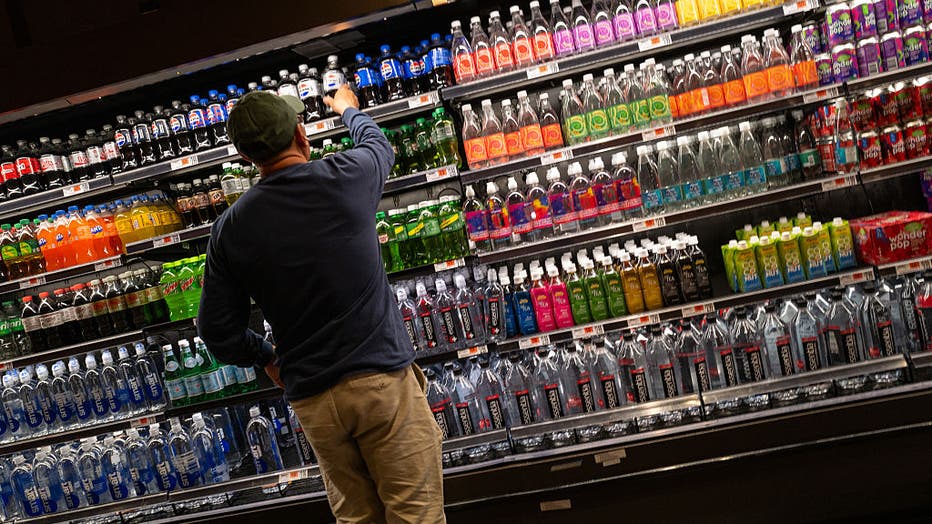Surge in steel tariffs could threaten Trump promise of lower grocery prices

President Trump announces double tariffs on steel
President Trump announced Friday that he is doubling tariffs on steel imports from 25 percent to 50 percent. The announcement came during a rally at a steel plant in West Mifflin, Pennsylvania.
NEW YORK - President Donald Trump’s effort to double down on tariffs on foreign steel and aluminum could mean pricier grocery items.
The announcement Friday of a staggering 50% levy on those imports stoked fear that big-ticket purchases from cars to washing machines to houses could see major price increases.
But those metals are so ubiquitous in packaging, they’re likely to pack a punch across consumer products from soup to nuts.
The backstory:
Trump’s return to the White House has come with an unrivaled barrage of tariffs, with levies threatened, added and, often, taken away, in such a whiplash-inducing frenzy it’s hard to keep up. He insisted the latest tariff hike was necessary to "even further secure the steel industry in the U.S."
RELATED: US-built vehicles cost $53,000 on average, pricing out budget shoppers
That promise, though, could be at odds with his pledge to reduce food costs.

A man stocks shelves at a grocery store in Brooklyn on May 13, 2025 in New York City. (Photo by Spencer Platt/Getty Images)
What they're saying:
Rising grocery prices, Trump has said, were among the biggest reasons voters swung his way. A look around a supermarket makes clear how many products could be impacted by new taxes on steel and aluminum, from beer and soda to dog food to can after can of beans, fruit, tomato paste and more.

Appeals court reverses block on Trump tariffs
A federal appeals court temporarily reinstated President Donald Trump's tariffs on Thursday, a day after a U.S. trade court ruled that Trump had exceeded his authority in imposing the duties and ordered an immediate block on them. Tim Phillip, the Director of Government Affairs and Global Strategies at Nestpoint joined LiveNOW from FOX's Josh Breslow to explain what it means.
Trump appeared before a crowd of cheering steelworkers to unveil the new tariffs at a rally outside Pittsburgh. In a statement, David McCall, president of the United Steelworkers International union, called tariffs "a valuable tool in balancing the scales" but "wider reforms of our global trading system" are needed.
The other side:
"Rising grocery prices would be part of the ripple effects," says Usha Haley, an expert on trade and professor at Wichita State University, who added that the tariffs could raise costs across industries and further strain ties with allies "without aiding a long-term U.S. manufacturing revival."
RELATED: Appeals court temporarily reinstates Trump tariffs
"It plays into the hands of China and other foreign canned food producers, which are more than happy to undercut American farmers and food producers," insists Can Manufacturers Institute president Robert Budway. "Doubling the steel tariff will further increase the cost of canned goods at the grocery store."

President Trump takes questions on tariffs, Harvard
After signing a series of executive orders relating to nuclear energy, President Trump took questions from reporters in the Oval Office on topics such as iPhone tariffs, Harvard University, and car production in the United States.
Budway says production by domestic tin mill steel producers, whose products are used in cans, have dramatically decreased in recent years, making manufacturers reliant on imported materials. When those prices go up, he says, "the cost is levied upon millions of American families."
By the numbers:
Food companies were already warily assessing the administration’s tariffs before the latest hike, which Trump said would go into effect on Wednesday. The Campbell Co., whose soup cans are a staple for millions of Americans, has said it was working to mitigate the impact of tariffs but may be forced to raise prices. ConAgra Brands, which puts everything from cans of Reddi-Whip to cooking sprays like Pam on supermarket shelves, likewise has pointed to the impact steel and aluminum tariffs have.
RELATED: Here's how Trump responded to reporter's 'nastiest' tariff question
"We can’t get all of our materials from the US because there’s no supply," ConAgra CFO David Marberger said at a recent Goldman Sachs conference on global staples.
Why you should care:
Beyond the obvious products — canned foods like tuna, chicken broth and cranberry sauce — economists warn of a spillover effect that tariffs can have on a gamut of items. If the cost to build a store or buy a truck to haul food rise, the prices of products may follow.
It may be harder to gauge the weight of tariffs on, say, a can of chickpeas versus that of a new car, but consumers are likely to see myriad indirect costs from the levies, says Andreas Waldkirch, an economics professor at Colby College who teaches a class on international trade.
"Anybody who’s directly connected to the steel industry, they’re going to benefit. It’s just coming at a very high cost," Waldkirch says. "You may get a few more steel jobs. But all these indirect costs mean you then destroy jobs elsewhere. If you were to add that all in, you come up with a pretty large negative loss."
The Source: The Associated Press contributed to this report. The information in this story comes from a mix of Trump’s public statements, expert analysis, industry reactions, and comments from major food companies. This story was reported from Los Angeles.

